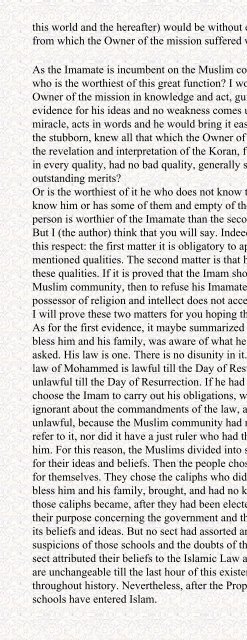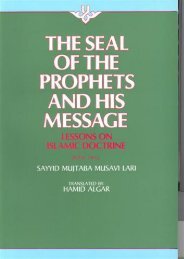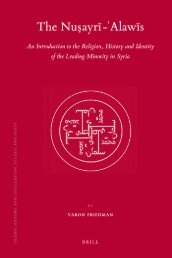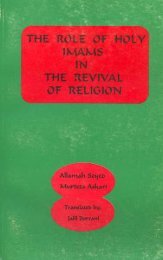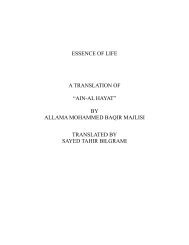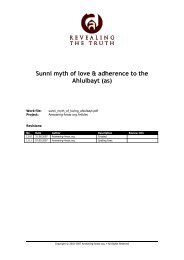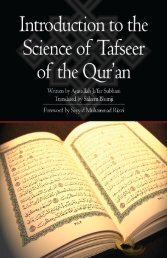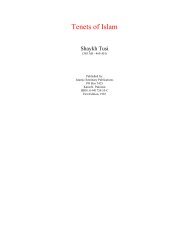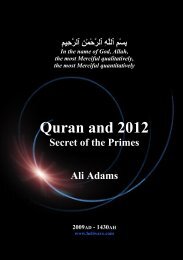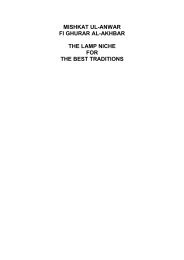Imam Al-Sadiq
Imam al-Sadiq - UMAA | Library
Imam al-Sadiq - UMAA | Library
- No tags were found...
You also want an ePaper? Increase the reach of your titles
YUMPU automatically turns print PDFs into web optimized ePapers that Google loves.
this world and the hereafter) would be without execution. In the meantime all those efforts<br />
from which the Owner of the mission suffered would be useless.<br />
As the <strong>Imam</strong>ate is incumbent on the Muslim community on the account of necessity, then<br />
who is the worthiest of this great function? I wonder: Is the worthiest one who was like the<br />
Owner of the mission in knowledge and act, guided in himself and guides others, provided<br />
evidence for his ideas and no weakness comes upon his evidence? If people asked him for a<br />
miracle, acts in words and he would bring it easily and without hesitation, convinced easily<br />
the stubborn, knew all that which the Owner of the mission brought and acted upon it, knew<br />
the revelation and interpretation of the Koran, full of good qualities, rather the best of all men<br />
in every quality, had no bad quality, generally speaking the model of the Prophet in all his<br />
outstanding merits?<br />
Or is the worthiest of it he who does not know the above- mentioned qualities and they do not<br />
know him or has some of them and empty of the others? Without doubt, you will say: the first<br />
person is worthier of the <strong>Imam</strong>ate than the second person is.<br />
But I (the author) think that you will say. Indeed, all the importance is to prove two matters in<br />
this respect: the first matter it is obligatory to appoint an <strong>Imam</strong> according to the abovementioned<br />
qualities. The second matter is that he is in the Muslim community and he has all<br />
these qualities. If it is proved that the <strong>Imam</strong> should have these qualities and he is in the<br />
Muslim community, then to refuse his <strong>Imam</strong>ate and orders is stubbornness which the<br />
possessor of religion and intellect does not accept.<br />
I will prove these two matters for you hoping that you will hear and understand.<br />
As for the first evidence, it maybe summarized as follows: Surely, the Prophet, may <strong>Al</strong>lah<br />
bless him and his family, was aware of what he declared. He was not ignorant of what he was<br />
asked. His law is one. There is no disunity in it. It is immortal till the Day of Judgment. The<br />
law of Mohammed is lawful till the Day of Resurrection and what he declared unlawful is<br />
unlawful till the Day of Resurrection. If he had given a free hand to the Muslim community to<br />
choose the <strong>Imam</strong> to carry out his obligations, we would have found the Muslim community<br />
ignorant about the commandments of the law, and not distinguish between the lawful and the<br />
unlawful, because the Muslim community had no sound judgment about the science of law to<br />
refer to it, nor did it have a just ruler who had the ability to enforce the punishments to obey<br />
him. For this reason, the Muslims divided into schools and sects. Each sect provided evidence<br />
for their ideas and beliefs. Then the people chose one among themselves as a caliph and <strong>Imam</strong><br />
for themselves. They chose the caliphs who did not know all what the Prophet, may <strong>Al</strong>lah<br />
bless him and his family, brought, and had no knowledge of what they were asked about. As<br />
those caliphs became, after they had been elected, the just ruler, and as people did not find<br />
their purpose concerning the government and the commandments, every sect began showing<br />
its beliefs and ideas. But no sect had assorted arguments and clear evidence to refute the<br />
suspicions of those schools and the doubts of those ideas. The sects opposed each other. Each<br />
sect attributed their beliefs to the Islamic Law and religion though the lawful and the unlawful<br />
are unchangeable till the last hour of this existence and the Islamic law is one and immortal<br />
throughout history. Nevertheless, after the Prophet of Islam, legislators, laws, beliefs, and<br />
schools have entered Islam.


